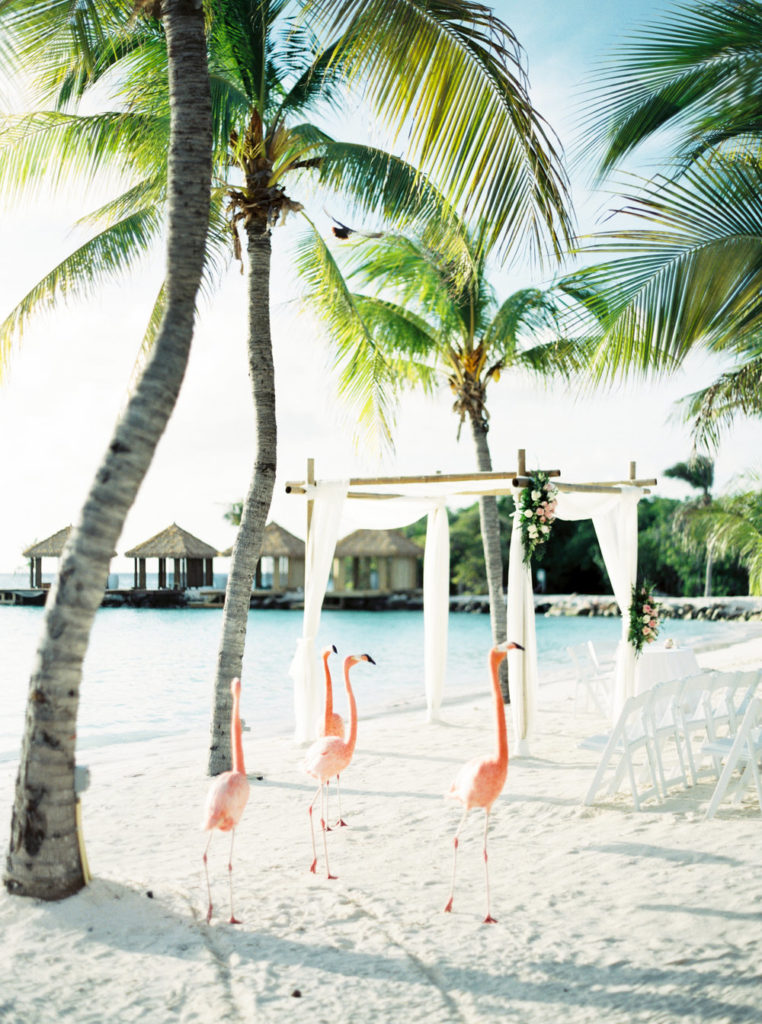Cabo San Lucas Destination Wedding Design by Meggie Francisco. Photo by Lauren Peele.

Meggie Francisco - Meggie Francisco Events
Destination event planner and designer specializing in intimate adventures. Her thoughtful and creative approach emphasizes the importance of creating gatherings grounded in purpose. Francisco’s work has been featured in publications around the world including The New York Times, Martha Stewart, Style Me Pretty, and Inside Weddings.
Find Meggie:
COVID-19 & Your Destination Event: 6 Risks to Consider
It’s no secret that COVID-19 has upended the events industry. Mass cancellations and postponements have devastated businesses small and large, resulting in requests for industry-wide emergency federal aid. On top of the financial havoc, event planners are working hard to guide heartbroken clients through ever-changing scenarios. For destination events, the stakes can be even higher.
Destination Events: Risks and Rewards
Having planned celebrations in far-flung locations like Italy, Mexico, Costa Rica, Grand Cayman and more, I know well the risks and rewards of destination events. Even in good times, there are unique challenges to consider: Where will guests stay in this remote part of the world? How will we help them navigate language barriers? What’s our backup plan if a tropical storm appears or an avalanche cuts off the main road?
After navigating the treacherous road of risks and crafting painstakingly detailed event communication, there’s nothing sweeter than seeing my clients and their guests enjoy the experience of a lifetime. Destination events sweep people out of their everyday lives into a transformative new reality. Relationships grow and deepen in new ways, and new perspectives bloom. For all the risks that afflict adventurous events, the rewards are abundant.

Flamingos walking near a destination wedding in Aruba, planned by Meggie Francisco. Photo by Tracy Enoch.

Groom and groomsmen at a destination wedding in Puglia, Italy, planned by Meggie Francisco. Photo by Tracy Enoch.
COVID-19: A New Season of Risk
Thanks to COVID-19, we have a new assortment of risks to consider when planning destination events. While times are troubling, a quick look at history lets us know that we will overcome this and celebrate. Humans are resilient; we’ve endured tragedies like world wars, economic depressions, and all manner of plagues only to party on the other side. We grieve the losses deeply, but eventually find the strength to celebrate again.
For destination event planners and clients planning destination events, this means we must keep hope while constructing our event road maps wisely. We’ve always respected the risks of hurricane season for Caribbean events and winter storm season for mountain celebrations. Now, we should heed a new type of season and the risks it presents.
Top 6 Destination Event Risks from COVID-19
Because the news is changing every day, it’s impossible to summarize all the new destination event risks posed by COVID-19 in just one article. For that reason, I’ll cover the top 6 risks that I see right now, along with some ideas for how they might be mitigated.
Please know that I am not an attorney or financial advisor. The advice provided below is not all-inclusive and is provided for educational benefit only.
International Border Restrictions – For some time, it may be difficult to cross borders as freely as we did in the past. Borders may even close without warning. Last year, my husband and I hiked the Inca Trail to Machu Picchu in Peru. Since then, we’ve been part of a community of travelers who hope to do the same. As of today’s writing, some Americans have been stuck in Peru for nearly a month after a sudden and unexpected travel ban. Embassy responses have been slow, and many people have resorted to online Facebook groups to communicate about solutions.
Clearly, this is a very high risk to international destination events, which is why I’ve made it the first one on the list. Planners should always know the locations and contact information of their home country embassies for destination events, however, this unique situation shows that may not be enough to protect clients and guests. In my professional opinion, the best way to mitigate this risk is to simply postpone international events into 2021.
Quarantine Requirements – Upon arrival to some countries, and even to some US States, visitors may be required to quarantine for at least two weeks. For destination events, this means that guests might have to arrive at least two weeks before the event date in order to attend. This is most likely not realistic for guests’ time or finances. To mitigate this risk, it would be best to carefully research any quarantine requirements for the destination location, and make decisions knowing the rules can change without notice. Event postponement may be the wisest choice.
Access to Healthcare While Traveling – Regardless of COVID-19, destination event planners should always know the address and contact number for the nearest hospital, the country’s emergency phone number, and the best way to secure an ambulance (for instance, in some countries, a private ambulance may arrive much more quickly). These are basics in the work we do.
However, new risks presented by COVID-19 may require additional research and planning. It’s important to know how the destination location handles international patients; in some countries, cash payment may be required. Clients and their guests should carefully review their health insurance policies to see how they’re covered while traveling internationally. Extra travel insurance may need to be purchased, and the policy reviewed by an attorney to ensure it covers healthcare needs during a pandemic and/or repatriation (these coverages may be excluded).
Event Venue, Hotel, and Restaurant Closings – Once border restrictions and quarantine requirements are lifted, it’s important to have a plan if hotels and restaurants aren’t fully operational for guest comfort and safety. COVID-19 poses a grim threat to the hospitality industry at large, and event planners and their clients should take this risk management seriously. When planning destination events, be sure to have backup venues or dates in mind in the event that the original location becomes unavailable. Ensure that any deposits paid would not pose a significant financial risk to the client if lost; it may not be possible to predict future bankruptcy or refund refusals by the venue or service providers. It may also be wise for clients to have an attorney review any new contracts to make sure cancellation, postponement and force majeure policies are fair.
Regarding access to restaurants, event planners and clients should think carefully about how guests will be fed throughout their travels. It may be necessary to provide catered meals with locally sourced ingredients. This can be a great opportunity to support local businesses, but it’s also important to ensure guests can be accommodated safely.
Closed Cultural Attractions – One of the great appeals of destination events is the ability to experience cultural sites and unique local activities. Around the world, iconic spots have shuttered in response to COVID-19. New York’s Broadway theatres and Las Vegas’s neon lights have gone dark. Paris’s revered Louvre Museum is closed until further notice. Peter’s Square in Rome is closed on Easter weekend.
Once we know more about this virus and life returns to a semblance of normal, places that draw large crowds may remain closed or limit visitors. Event planners and their clients might consider trimming the overall guest list, both for safety at the actual event and to open doors for more intimate activity options. Adventure plans can pivot – for instance, opt for a socially distanced bike tour through fresh countryside air over a cramped museum visit.
Supply Chain Challenges – Our world is interconnected, and with that comes unprecedented access to new and different resources. Unfortunately, we’ve come to take this access for granted, especially when it comes to event elements like food, flowers, and decor.
It’s not uncommon to see flowers from Holland featured at a wedding in Italy, or South American blooms gracing the table at a Mexican fiesta. Tragically, shipments are now delayed, resulting in flowers being destroyed. They will never grace a wedding banquet table or even an intimate family dinner.
Similarly, many fabrics that are produced into attire, table linens and drapery are shipped from China, Europe, and India. Even the foods we enjoy come from around the world, such as avocados from Mexico, semolina pasta from Italy and wine from Chile.
Even once the health threat of this virus passes, destination event planners and clients may need to be flexible on food and décor plans. Availability may be limited, and prices may increase. For this reason, everyone should be open to locally sourced amenities and perhaps even a more minimalist style.

Tulips in the Netherlands are being destroyed due to shipping troubles from COVID-19. Photo by Meggie Francisco.

Destination event in Mexico planned by Meggie Francisco. Photo by Lauren Peele.
We’re in This Together
Risks are just that: potential for danger. All life presents some sort of risk, from boarding a plane, to turning the key in a car’s ignition, to taking a swim in the ocean. There’s no reason to panic. When it comes to COVID-19 and destination events, the most responsible and healthy thing we can do is to be patient and listen to medical professionals so we make smart choices.
The events industry may be under fire, but we are still strong because we help people to gather in meaningful ways that make life rich. If we proceed with professionalism and sincere care for our clients and valued professionals, we will make it through this together!

